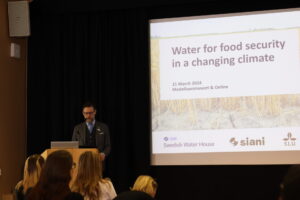Paper zooms in on gender issues in transboundary water management
The paper "a gendered critique of transboundary water management", written by SIWI's Anton Earle and Susan Bazilli, has been published in the Feminist Review.

The starting point of this paper is that most of the international transboundary water management (TWM) processes taking place globally are driven by ‘the hydraulic mission’ — primarily the construction of mega-infrastructure such as dams and water transfer schemes. The paper argues that such heroic engineering approaches are essentially a masculinised discourse, with its emphasis being on construction, command and control.
As a result of this masculinised discourse, the primary actors in TWM processes have been states — represented by technical, economic and political elites operating in what generally gets termed ‘the national interest’. Left out are the local communities relying on the resource directly: the water users; the poor; women; and other important groups.
Instruments such as the UN Watercourses Convention of 1997 make an effort to present an attempt at a gender-balanced approach — through asserting the importance of the ‘no-harm rule’ and the ‘equitable share approach’. However, they end up supporting the status quo through the omission of any reference to gender issues.
The paper provides an overview of the masculinised discourse on TWM institutions, proposing that this is the case because of the intersection of two masculinised fields — water resource management and the disciplines engaged in the research of transboundary water management, namely, political science and international relations.
The paper investigates two southern African examples that illustrate the potential for including a gendered perspective and pro-poor policies that take into account the needs of the water users or ‘stakeholders’.
The analysis includes the international and regional legal agreements on transboundary water issues, searching for evidence of a gendered approach. It is concluded that the laws and organisations responsible for transboundary water management currently do not reflect a gendered approach, despite the international recognition given to the necessity of including women in water management structures at all levels.







